Nigeria Ministry Of Finance Through NMRC And FHF Have Contributed Over 13,542 Houses Says FG
…To complete 2nd Niger bridge, Lagos-Ibadan road, others in 12 months
…Issues N78bn tax credit
…We’ve increased allocation to infrastructure by 1000% – Lai Mohammed
The Federal government says it plans to spend N1.42 trillion on infrastructure and N2.11 trillion on human capital development in 2022 alone.
The Minister of Finance, Budget and national Planning, Mrs. Zainab Ahmed disclosed this at the Town hall Meeting on the achievements of the Federal government in infrastructure development organised by the Ministry of Information and Culture in Abuja.
She said the Administration is determined to prioritize spending on infrastructure and human capital to catalyze rapid economic development, hence the increased budgetary allocation for infrastructure and human capacity development.
‘‘This Administration will continues to prioritize spending on infrastructure and human capital to catalyze rapid economic development. In 2022 alone, we plan to spend about N1.42 trillion on infrastructure and N2.11 trillion on human capital development.’’
The minister, who praised her information counterpart for organizing the Town hall meeting, said the Administration had successfully implemented a range of infrastructure programmes that have had a positive impact on the lives and livelihoods of the citizenry, against the backdrop of numerous challenges confronting the nation.

Road infrastructure
Highlighting some of the programmes initiated by her ministry as well as those initiatives that the Ministry is helping to facilitate in other ministries, Ahmed said a road Infrastructure Development and Refurbishment Investment Tax Credit Scheme (RITCS) was launched in 2019 to leverage private sector capital and expertise to construct, repair and maintain critical road infrastructure in key economic corridors and industrial clusters in Nigeria.
The RITCS scheme, according to her, was designed to complement and ameliorate the burden of funding significant capital outlays on road projects by the Federal Government. ‘‘As a model, the RITCS adopts the use of tax expenditures, via tax credits, to finance the construction of critical road and bridge infrastructure projects, while utilizing an innovative PPP mechanism that is aimed at the incentivisation of private sector participation and capital investments.
The Scheme commenced in 2019, with the President’s approval of 19 Road Projects covering 769.16 km and located in 11 states across the six geopolitical zones.
Since the inception of the RITCS, the President has approved 14 additional roads, bringing the total to thirty-three (33) Road Projects, covering a total length of 1,564.95 km as of 2021. These additional projects are in 19 States across the six (6) geo-political zones in the country. In the last three years (2019 – 2021), about N78 billion worth of tax credits have been issued to investors under the RITCS. In addition, the NNPC is to finance the construction of 21 roads across the country.’’
Infrastructure Fund
On infrastructure fund, the minister said the Nigeria Infrastructure Fund (NIF) is one of the three ring-fenced funds established under the Nigeria Infrastructure Authority, NSIA designed to catalyze the growth of key sectors; support projects of national importance and attract FDIs in the infrastructure sectors of agriculture, Healthcare, Power, Gas, etc.
Consequently, the Minister said had invested and completed 13 projects across seven (7) key sectors over a period of 7 years, including healthcare, education, agriculture, financial services, and housing.
Some of the completed projects comprise the UFF-NAIC Agri Fund, established with Old Mutual to invest in processing opportunities with backward integration to primary agriculture; the Fund for Agricultural Finance in Nigeria (FAFIN) – an agriculture-focused private equity fund for agricultural SMEs across Nigeria. Also, she said another major investment made within the period include AFAM III Fast Power – a N10.4 billion investment in the procurement and local assembly of Solar Home Systems, as part of the FGN solar strategy for the electrification of 5 million households.
Housing
On housing, she said the ministry through the Nigeria Mortgage Refinance Company (NMRC) and the Family Homes Funds (FMF) scheme had contributed a total of over 13,542 houses In the last three years (2019 – 2021).
Health Sector
In the healthcare sector, she said three infrastructure projects worth US$22.5 million have been completed, which include the NSIA-LUTH Oncology Centre, which has provided services to over 4,000 patients since its commissioning. Others are the NSIA-FMCU and the NSIA-AKTH Diagnostic Centres – two (2) ultra-modern facilities located at Abia and Kano states and have provided services to over 47,000 clients.
Sukuk bonds
Also speaking of the funding of Federal roads through the Sukuk bonbs, the minister said since the debut of the N100 billion Sovereign Sukuk in September 2017, the DMO has issued three more, getting better each time and bringing the total amount so far raised through the Sukuk window to N612.56 billion.
Since the emergence of Sukuk as a financing window for infrastructure in September 2017, a total of N362.56 billion has been given to the Federal Ministry of Works and Housing (FMWH) to fund key road projects. The first Sukuk of N100 billion was deployed to 25 roads and it delivered a total of N482 km; the second Sukuk in 2018 was deployed to 28 roads and it delivered a total of 643 km; the third 2020, of N162 billion was deployed to 44 roads and delivered 757 km.
The proceeds of the N250 billion Sukuk bond, fourth in its series, with a 10-year tenure, would be used to finance the rehabilitation and reconstruction of road projects across the six geopolitical zones and the Federal Capital Territory.
The N250 billion Sukuk, which opened on Dec. 16, 2021 and closed on Dec. 23, 2021, was oversubscribed by 346 percent. The Federal Ministry of Works & Housing, Federal Capital Territory Administration (FCTA) and Ministry of Niger Delta Affairs (MNDA shared the Sukuk issue proceeds of N250 billion with the ministries receiving N210.56 billion, N29 billion and N10.44 billion respectively.
According to her, some of the roads funded under the Sukuk Include: Oju/Loko-Oweto bridge over River Benue to link Loko (Nasarawa state) and Oweto (Benue state) along route; dualisation of the Abuja-Abaji-Lokoja road section I junction – Sheda village; Suleja-Minna road in Niger state phase; Lokoja- Benin road: Obajana-Okene in Kogi state and Kano-Maiduguri road linking Kano-Jigawa-Bauchi- Yobe among others.
Power Sector Initiative
On power sector, the Minister said the federal government plans to provide over 40 million people with more reliable electricity supply, create 11,000 direct and indirect jobs for Nigerians first phase of the Presidential Power Initiative will.
‘‘This will be from power system engineers to electricians and contractors, and this will in turn improve the standard of living while providing homes and businesses with constant, reliable, and affordable electricity supply. Under the first phase, software has been supplied; training of Nigerians on network design ongoing; 10 mobile substations to address transmission inadequacies have been acquired; and AFC engaged as transaction advisers for the PPI.
‘‘President Buhari launched the 614-kilometre AKK gas pipeline project on July 1, 2021 to enhance the country’s energy security. The government provided the sovereign guarantee for Ajaokuta-Kaduna-Kano (AKK) pipeline, which will drive industrialisation across the country.’’
Earlier in his address, the Minister of Information and culture, Alh. Lai Mohammed said the Town Hall Meeting, the 21st edition since the programme kick-started
in Lagos in 2016, is one of the more than half a dozen Town Hall Meetings which have been slated for this year to showcase the achievements of the Administration of President Muhammadu Buhari, as the Administration gradually winds up.
According to him, the second edition of the Town Hall will feature the Ministers of Transportation; Aviation; Water Resources as well as Communications and Digital Economy, while the third and fourth editions will also be dedicated to infrastructure development in the Federal Capital Territory and the
Administration’s strides in the area of the National Social Investment
Programme; fight against corruption; insecurity; national unity and the economy, among others.
While corroborating the statement by his Finance counterpart, Mohammed said the administration has shown uncommon commitment to infrastructure development, increasing capital budget for infrastructure from 19.8 billion in 2015 to N399 billion in 2021 and N541 billion in 2022.
In his own presentation, the minister of works, Mr. Babatunde Fashola said the ministry had awarded 1,018 road contracts covering 859 projects across the 36 states of the federation and the FCT.
He said the impact of the road projects so far completed have started impacting on the lives and economic wellbeing of the people.
Fashola, who listed 2nd Niger bridge, Lagos-Ibadan and Abuja-Kano express ways as priority projects for the administration said efforts is being made to ensure their completion before the end of this administration.
On his part, the Minister of State for Power, Goddy Jedy Agba said the ministry had touched at least two communities in the six geo-political zones of the country in provision of electricity supply.
Also, the minister informed that the ministry had equally intervened in several tertiary institutions, providing them with sustainable power supply.
He also said about N22 billion loans had been approved to metre 5 million houses across Nigeria.
#Houses #NMRC #FHF #FG #infrastructure #bridge #Road
Source: vanguardngr





